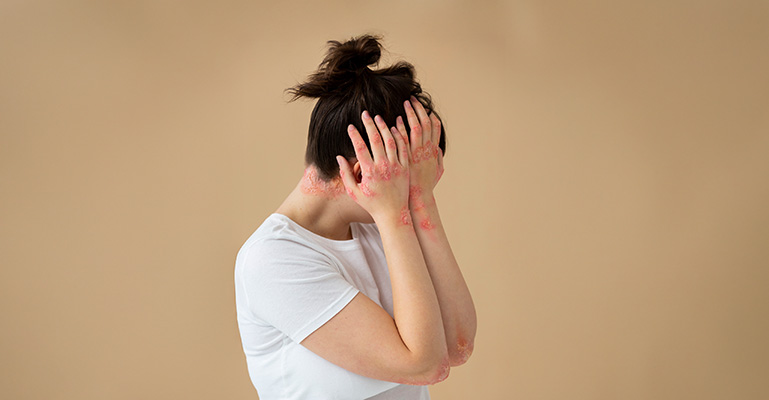



The skin, the body’s largest organ, plays a vital role in protecting us from external threats and shaping our identity. Any disorder affecting the skin not only impacts our physical health but also our self-esteem and social confidence. One such condition is psoriasis a chronic, often misunderstood skin disorder.
What is Psoriasis?
Psoriasis is a chronic skin condition marked by the rapid buildup of skin cells, resulting in scaling and inflammation. These scaly patches can appear anywhere on the body (especially on knees, elbows, trunk, and scalp) and are often itchy, painful, and emotionally distressing.
Although the exact cause of psoriasis remains unclear, it is often linked to genetic predisposition, environmental triggers, and a compromised immune system.
Common Symptoms of Psoriasis
These symptoms can vary in severity and often go through cycles of flaring up and subsiding.
Can Psoriasis Go Away?
Psoriasis is a chronic condition, meaning it persists over time. While there is no definitive cure, symptoms can be managed effectively through various treatments and lifestyle modifications. Some individuals may experience periods of remission where symptoms improve or disappear temporarily.
Why Does Psoriasis Flare Up?
Several factors can trigger psoriasis flare-ups, including:
Identifying and avoiding personal triggers can help in managing the condition.
While both are skin conditions causing redness and itching, psoriasis typically results in thicker, scaly patches and is linked to an overactive immune system. Eczema often presents as inflamed, itchy skin and is commonly associated with allergies. Understanding the differences between these conditions is crucial for effective treatment.
Ayurvedic Approach to Managing Psoriasis
While modern medicine offers treatments to manage psoriasis, Ayurveda provides holistic and natural ways to address the root cause and support overall well-being.
Panchakarma Therapies
Panchakarma therapies are at the core of Ayurvedic treatment for psoriasis. These cleansing and detoxification procedures help eliminate accumulated toxins from the body, aiming to balance the doshas.
Takra Dhara
Takra Dhara, a therapeutic treatment involving medicated buttermilk (often infused with Kushtagna Gana herbs), can help soothe inflamed skin and calm the nervous system.
Internal Medications and External Applications
Internal medications and external applications (like Bruhath Danthapala Thailam) are also prescribed to balance the doshas and strengthen immunity.
For those interested in exploring Ayurvedic treatments, consider visiting an Ayurvedic medicine online store for more information and product options.
Lifestyle Modifications for Managing Psoriasis
Ayurvedic treatment works best when complemented with supportive lifestyle changes:
Adequate Sleep
Maintaining a regular sleep routine helps rejuvenate the body, lowers stress hormone levels, and supports the healing process.
Balanced Diet
Eating a diet rich in fresh, whole foods while avoiding processed and oily foods can help manage psoriasis symptoms and reduce flare-ups. In Ayurveda, certain food combinations are considered incompatible (Viruddha Ahara) and may aggravate the condition. Avoiding such combinations is recommended.
Emotional and Psychological Support
Addressing mental well-being is crucial during psoriasis treatment. Incorporating stress-relieving activities like pranayama, meditation, and yoga into your daily routine can promote emotional balance and improve overall treatment outcomes.
Psoriasis and Quality of Life
Psoriasis doesn’t just cause physical discomfort—it can lead to social stigma, emotional distress, and a significant drop in quality of life. It's essential to approach the condition with empathy, awareness, and a comprehensive care plan that supports both body and mind.
Conclusion
Managing psoriasis effectively requires a combination of consistent care, natural remedies, and emotional resilience. Although psoriasis is not curable permanently, it can be controlled with the right approach. By understanding what causes psoriasis, recognizing personal triggers for flare-ups, and choosing to manage psoriasis naturally, individuals can reduce symptoms and live more comfortably. Ayurvedic solutions like Vaidyaratnam’s Bruhath Danthapala Thailam helps to offer gentle, long-term relief by supporting skin healing . When paired with a psoriasis-friendly diet, proper sleep, stress reduction, and regular use of internal herbal medications, many people experience fewer and less severe flare-ups. Choosing the right care strategy means less discomfort, improved self-confidence, and a better overall quality of life. You can explore trusted remedies and learn more from our Online Ayurvedic Store




